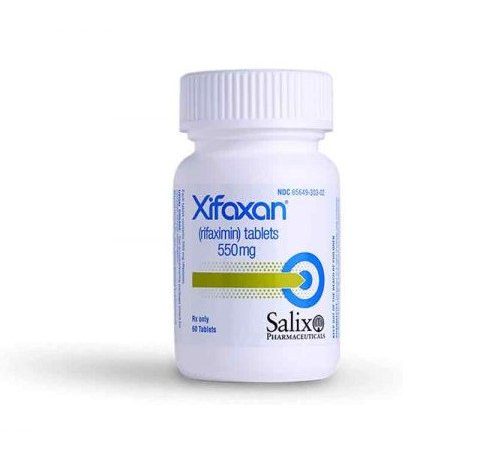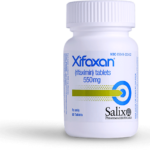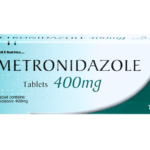Xifaxan: Uses, Dosage, Side Effects, Interaction

Xifaxan is a brand of Rifaximin, a class of medications called antibiotics. Rifaximin treats traveler’s diarrhea and irritable bowel syndrome by stopping the growth of the bacteria that cause diarrhea. Irritable bowel syndrome is a very common disorder and scientific tests show that about 10% to 15% of people in the United States have it. Rifaximin treats hepatic encephalopathy by stopping the growth of bacteria that produce toxins and that may worsen liver disease.
Xifaxan 200-mg tablets are used to treat traveler’s diarrhea caused by certain bacteria in adults and children at least 12 years of age. Xifaxan 550-mg tablets are used to prevent episodes of hepatic encephalopathy (changes in thinking, behavior, and personality caused by a build-up of toxins in the brain in people who have liver disease) in adults who have liver disease and to treat irritable bowel syndrome (with diarrhea) in adults. Xifaxan is an Antibiotics as such Xifaxan will not work for colds, flu, or other viral infections. Taking antibiotics when they are not needed increases your risk of getting an infection later that resists antibiotic treatment.
How should Xifaxan be used?
Xifaxan comes as a tablet to take by mouth with or without food. When Xifaxan is used to treat traveler’s diarrhea, it is usually taken three times a day for 3 days. When Xifaxan is used to prevent episodes of hepatic encephalopathy, it is usually taken twice a day. When Xifaxan is used to treat irritable bowel syndrome, it is usually taken three times a day for 14 days. To help you remember to take Xifaxan, take it around the same times every day. Follow the directions on your prescription label carefully, and ask your doctor or pharmacist to explain any part you do not understand. Take Xifaxan exactly as directed. Do not take more or less of it or take it more often than prescribed by your doctor.
If you are taking Xifaxan to treat traveler’s diarrhea, your symptoms should improve within 24 to 48 hours after you start taking the medication. If your symptoms do not go away or they get worse, or if you develop a fever or bloody diarrhea, call your doctor.
If you are taking Xifaxan to treat irritable bowel syndrome and your symptoms return after you have finished your treatment, call your doctor.
Take Xifaxan as directed, even if you feel better. If you are taking Xifaxan to treat traveler’s diarrhea or irritable bowel syndrome and you stop taking it too soon or if you skip doses, your infection may not be completely cured and the bacteria may become resistant to antibiotics. If you are taking Xifaxan to prevent hepatic encephalopathy, do not stop taking it without talking to your doctor as you may experience symptoms of encephalopathy.
Other uses for this medicine
This medication may be prescribed for other uses; ask your doctor or pharmacist for more information.
What special precautions should I follow?
Before taking Xifaxan,
• tell your doctor and pharmacist if you are allergic to Xifaxan, rifabutin (Mycobutin), rifampin (Rifadin, Rifamate, Rifater, Rimactane), rifapentine (Priftin), any other medications, or any of the ingredients in Xifaxan capsules. Ask your doctor or pharmacist for a list of the ingredients.
• tell your doctor and pharmacist what other prescription and nonprescription medications, vitamins, nutritional supplements, and herbal products you are taking or have recently taken. Be sure to mention cyclosporine (Gengraf, Neoral, Restasis, Sandimmune) or other antibiotics. Your doctor may have to change the doses of your medications, monitor you carefully for side effects or treat your diarrhea differently.
• tell your doctor if you have or have ever had liver disease.
• tell your doctor if you are pregnant, plan to become pregnant, or are breastfeeding. If you become pregnant while taking Xifaxan, call your doctor.
What special dietary instructions should I follow?
Unless your doctor tells you otherwise, continue your normal diet.
What should I do if I forget a dose?
Take the missed dose as soon as you remember it. However, if it is almost time for the next dose, skip the missed dose and continue your regular dosing schedule. Do not take a double dose to make up for a missed one.
What are the side effects of Xifaxan?
Xifaxan may cause side effects. Tell your doctor if any of these symptoms are severe or do not go away:
• nausea
• stomach pain
• dizziness
• excessive tiredness
• headache
• muscle tightening
• joint pain
Some side effects can be serious. If you experience any of the following symptoms, call your doctor immediately:
• watery or bloody diarrhea that may occur along with stomach cramps and fever during your treatment or for 2 months afterward
• hives
• rash
• itching
• difficulty breathing or swallowing
• swelling of the face, throat, tongue, lips, eyes, hands, feet, ankles, or lower legs
• hoarseness
Xifaxan may cause other side effects. Call your doctor if you have any unusual problems while taking this medication.
If you experience a serious side effect, you or your doctor may send a report to the Food and Drug Administration’s (FDA) MedWatch Adverse Event Reporting program online (http://www.fda.gov/Safety/MedWatch) or by phone (1-800-332-1088).
In case of emergency/overdose
In case of overdose, call the poison control helpline at 1-800-222-1222. Information is also available online at https://www.poisonhelp.org/help. If the victim has collapsed, had a seizure, has trouble breathing, or can’t be awakened, immediately call emergency services at 911.
Xifaxan Safety Information
You should not use take Xifaxan if you are allergic to rifaximin or medications such as rifabutin (Mycobutin), rifampin (Rifater, Rifadin, Rifamate), or rifapentine (Priftin). Before you take Xifaxan, tell your doctor if you have severe liver disease, diarrhea with fever, or diarrhea that is watery or has blood in it. Take Xifaxan for the full prescribed length of time. Your symptoms may improve before the infection is completely cleared. Rifaximin will not treat a viral infection such as the common cold or flu, or any form of diarrhea that is caused by a virus. Call your doctor if your symptoms do not improve after 24 hours, or if they get worse while taking this medicine. Xifaxan does not treat all bacterial forms of traveler’s diarrhea.
What other information should I know?
Keep all appointments with your doctor.
Do not let anyone else take your medication. Ask your pharmacist if you have any questions about refilling your prescription.
It is important for you to keep a written list of all of the prescription and nonprescription (over-the-counter) medicines you are taking, as well as any products such as vitamins, minerals, or other dietary supplements. You should bring this list with you each time you visit a doctor or if you are admitted to a hospital. It is also important information to carry with you in case of emergencies.





